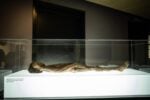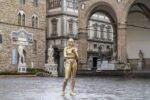Patrick Tuttofuoco – Ambaradan
.jpg)
Proprio alla città che l’ha cresciuto sia personalmente che artisticamente è a suo modo dedicata questa nuova serie di lavori, che nasce dall’esigenza di confrontarsi con le trasformazioni del contesto urbano, le mutazioni dei consumi, e la permeabilità del sistema dell’arte cittadino.
Comunicato stampa
PATRICK TUTTOFUOCO
Ambaradan
STUDIO GUENZANI, via Eustachi 10, Milano
MCDONALD’S, passaggio Duomo 2, Milano
ERMANNO PREVIDI, via Benedetto Marcello 2, Milano
Guardò per un'ultima fugace volta il vassoio semi-vuoto che giaceva di fronte a lui – la carta stropicciata, residui di salsa e resti di patatine, una cannuccia ancora avvolta nella sua confezione bianca – poi con un movimento lento ma deciso si alzò. Le mani a fare pressione sul tavolo, i polpacci che con una leggera spinta allontanano la sedia, la schiena che assume una posizione eretta. Solo una vibrazione nella tasca destra dei pantaloni interruppe il movimento. Estrasse il telefono e passò delicatamente il pollice sullo schermo, lasciando una traccia sulla superficie altrimenti immacolata. Un altro cliente, non distante da lui e seduto anch’egli da solo davanti ad un vassoio semi-vuoto, osservò l'abbagliante luce del display riflettersi negli occhi di lui mentre leggeva il contenuto del messaggio: via degli Omenoni numero 3. Ricacciò in tasca il telefono, prese con entrambe le mani il vassoio e lo ripose sul cestino alle sue spalle, quello con sopra inciso un doppio arco dorato.
Dopo essersi infilato la giacca, una manica per volta, scese un piano di scale e usci nella piazza. L’aria era quella di inizio autunno. Davanti a lui si ergeva la cattedrale illuminata, alla sua sinistra i portici con i negozi anche loro illuminati. Se avesse spostato lo sguardo verso destra e verso l'alto avrebbe notato la grossa scritta in neon rosso che sembrava fluttuare nell’aria al buio della sera. Decise di prendere lo scooter. Era parcheggiato accanto ad un piccolo taxi bianco, e da lontano sembrava grande esattamente la metà di quest'ultimo. Due minuti di pavé e di una brezza fredda sul collo scoperto e sulle mani senza guanti e fu a destinazione. Parcheggiò sul marciapiede. Lei gli si fece incontro con passo veloce e, prima ancora che avesse il tempo di togliersi il casco, gli disse tutto d'un fiato e con una certa apprensione: “E adesso, senza barbari, cosa sarà di noi?” Lui non rispose, ma mentre scendeva dallo scooter, inseriva il bloccasterzo e apriva il sottosella, si limitò a pensare, con rammarico e frustrazione: “Era una soluzione, quella gente.”
Dopo 5 anni, Patrick Tuttofuoco torna a Milano con una mostra personale a cura di Nicola Ricciardi. Proprio alla città che l'ha cresciuto sia personalmente che artisticamente è a suo modo dedicata questa nuova serie di lavori, che nasce dall'esigenza di confrontarsi con le trasformazioni del contesto urbano, le mutazioni dei consumi, e la permeabilità del sistema dell'arte cittadino. Cinque sculture, liberamente ispirate alla facciata della Casa degli Omenoni, che continuano la ricerca da parte dell'artista intorno all'immagine dell'uomo e le sue possibili trasformazioni.
Le opere invadono sia la galleria sia alcuni spazi esterni - pubblici e privati - che esulano dal contesto dell'arte, ma che si sono tuttavia lasciati coinvolgere in un processo di negoziazione e scambio, cedendo all'artista alcuni loro oggetti-simbolo, esposti in galleria per la durata della mostra. Non readymades o semplici appropriazioni, ma segni tangibili di un pensiero: ovvero che sia solo nella predisposizione a lasciarsi contaminare che ogni realtà reca inscritta l'idea che ha di se stessa. A far da sfondo, un tappeto musicale, frutto della collaborazione con Novo Line, progetto musicale di un compositore Americano residente a Berlino.
Il progetto nasce dalla volontà di concretizzare una conversazione tra artista e curatore iniziata nell’estate del 2013 a Milano e continuata nel corso dei mesi tra Berlino e New York, e di approfondire un interesse condiviso nei confronti dei processi di mutazione culturale. A questo dialogo hanno preso parte nel tempo, con contributi di diversa natura e sostanza, anche Claudio Guenzani, Novo Line, Ermanno Previdi, McDonald’s e – inconsapevolmente – Alessandro Baricco. A loro vanno i più sentiti ringraziamenti da parte dell’artista e del curatore.
Patrick Tuttofuoco (1974) vive e lavora a Berlino. Le sue opere sono state esposte all'interno di contesti museali e in spazi pubblici sia in Italia (Biennale di Venezia, Galleria d'Arte Moderna di Milano, Piazza del Popolo a Roma, MART di Rovereto) che all'estero (Museum of Contemporary Art di Tokyo, De Appel di Amsterdam, Biennale di Shanghai, Biennale de l'Avana, Triennale di Folkstone). Nel 2013, Tuttofuoco è stato protagonista di una doppia personale assieme a Diego Perrone presso l’Antinori Familiae Museum a San Casciano e di una mostra personale, organizzata in collaborazione con la Fondazione Re Rebaudengo, presso l’Istituto Italiano di Cultura di Madrid.
Nicola Ricciardi (1985) vive e lavora a Brooklyn, New York. Ha studiato presso il Center for Curatorial Studies del Bard College a New York, e il Node Center for Curatorial Studies a Berlino. Nel 2013 ha fatto parte del team curatoriale della 55esima Biennale di Venezia, curata da Massimiliano Gioni.
English Version
March 28th – May 17th, 2014
PATRICK TUTTOFUOCO
Ambaradan
STUDIO GUENZANI, via Eustachi, 10 Milano
MCDONALD’S, passaggio Duomo, 2 Milano
ERMANNO PREVIDI, via Benedetto Marcello, 2 Milano
He gave one last fleeting look at the semi-hollow tray that laid in front of him - the crumpled paper, residual remnants of sauce and chips, a straw still wrapped in its white envelope – then he stood up, with a slow but firm movement; both hands against the table, calves slightly pushing away the chair, his back assuming an upright position. Only a vibration in the front right pocket of his pants broke the continuity of his motion. He took out his phone and passed his thumb gently across the screen, leaving a trace on the otherwise immaculate surface. Another customer, not far from him, and he too sitting alone in front of a half- empty tray, watched the dazzling light of the display reflecting in his eyes as he read the content of the message: “Via degli Omenoni number 3”. He then put the phone back into his pocket, took the tray with both hands and placed it on top of the trash bin behind him (the one with a double golden arch engraved on it).
After slipping on the jacket, one sleeve at a time, he descended a flight of stairs and went out into the square. The air smelled of autumn. Before him stood the cathedral, all lit up, and to his left were the porches, with the shops illuminated as well. If he had shifted his gaze to the right and upwards he would have noticed the big red neon sign that seemed to float in the darkness of the night. He decided to take the scooter. It was parked next to a small white taxicab, and from afar the bike looked e-x-a-c-t-l-y as big as half the car. After a two-minute ride, with a cool breeze on his neck and on his gloveless hands, he reached his destination. He stopped on the sidewalk; she was standing few feet away. Before he had time to take his helmet off, she said in one breath, and with some trepidation: "And now, what shall become of us without any barbarians?" He did not answer but as he stood down from the scooter, turned it off and put it on the stand, he thought, with a mix of regret, frustration and grief: "Those people were some kind of solution. "
After 5 years, Patrick Tuttofuoco returns to Milan with a solo exhibition curated by Nicola Ricciardi. To the city that has seen him grow - both personally and artistically – Tuttofuoco has dedicated this new series of works, which arise from the need to deal with the transformations of the urban context, the mutations in consumption patterns, and the permeability of the local art system. Five sculptures, loosely inspired by the facade of the “Casa degli Omenoni”, continue the artist’s research on and around the human image and its possible transformations.
The works are scattered within the gallery as well as in other spaces – both public and private – that lay outside the context of art, but that nonetheless decided to get involved in a process of negotiation and exchange. Besides hosting some of the sculptures, these spaces have loaned the artist some of their iconic objects that will be displayed in the gallery for the duration of the exhibition. Not ready-mades or simple appropriations, but tangible signs of a thought - that is, it is only in the predisposition to be “contaminated” that a culture can affirm itself. In the background, a soundtrack jointly created with Novo Line, sound-based project of a berlin-based American composer, plays in loop.
The project originates from the desire to materialize a conversation between the artist and the curator that started in Milan in the summer of 2013 and continued over the following months between Berlin and New York, which was based on a shared interest in the processes and practices of transformation of cultures. Since then, many have joined this open dialogue, with contributions of a different nature; among them Claudio Guenzani, Novo Line, Ermanno Previdi, McDonald’s and - unknowingly - Alessandro Baricco. To them goes the most heartfelt thank from the artist and the curator.
Patrick Tuttofuoco (1974) lives and works in Berlin. His pieces have been exhibited in several museums and in public spaces both in Italy (Venice Biennale, Gallery of Modern Art in Milan, Piazza del Popolo in Rome, MART) and internationally (Museum of Contemporary Art in Tokyo, de Appel in Amsterdam, Shanghai Biennial, Havana Biennial, Folkstone Triennial). In 2013, Tuttofuoco took part in a joint exhibition along with Diego Perrone at the Antinori Family Museum in San Casciano, Florence, and a solo show, organized in collaboration with Fondazione Re Rebaudengo, at the Italian Institute of Culture in Madrid.
Nicola Ricciardi (1985) lives and works in Brooklyn, New York. He studied at the Center for Curatorial Studies, Bard College in New York, and the Node Center for Curatorial Studies in Berlin. In 2013, he was part of the curatorial team of the 55th Venice Biennale, curated by Massimiliano Gioni.



